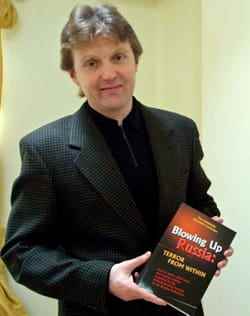LITVINENKO. A former Russian secret service agent, Alexandre Litvinenko was murdered with polonium in London in 2006. M6 tells his story in a four-part mini-series. Here is his biography.
From this Thursday evening, January 19, M6 is broadcasting the political series entitled: Polonium murder – the Litvinenko affair. It is the scriptwriter George Kay (already known for the Lupine series) who is at the helm of the mini-series. It comes in just four 52-minute episodes with David Tennant (Doctor Who) in the lead role. The story begins a few days after Alexander Litvinenko entered the hospital. Two investigators are called to the bedside of this man who says he was poisoned on the orders of Vladimir Putin. But why would the head of the Kremlin want to assassinate this man who has just obtained British citizenship? As a former Russian secret service agent, Alexander Litvinenko had access to a lot of sensitive information during his career. He has repeatedly denounced the actions of the Russian government. He attributed to this same government the five attacks which took place in Russia in 1999, the aim being according to him to be able to accuse the Chechens. By continuing to publish books, he hoped to expose all this.
Alexander Litvinenko was a Russian secret service agent. In 1998, he publicly denounces his mission orders and in particular the fact that he must assassinate the businessman Boris Berezovsky. Sacked and arrested, Litvinenko succeeded in fleeing Russia in 2000. Just after obtaining British citizenship, he was poisoned with polonium 210 on November 1, 2006. This poisoning caused a long agony that led to his death for three weeks. later. Two Russian citizens are the main suspects during the investigation. The death of Alexander Litvinenko will cause great tension between Russia and the United Kingdom.
Alexander Litvinenko, former secret service agent

Alexander Litvinenko served in the Russian state security services, first for the KGB, then for the FSB. As an intelligence officer, he specialized in the fight against organized crime and terrorism. Litvinenko began to publicly criticize the Russian authorities in 1998. He accused his hierarchy of the attempted assassination of former Russian oligarch Boris Berezovsky. Later, he accuses Moscow of being behind the wave of attacks suffered by Russia in 1999. The country incriminated the Chechens to justify brutal repression in the region. Arrested and imprisoned, Alexander Litvinenko managed to reach Great Britain in 2000 where he hid with his family under the name of Edwin Carter.
The death of Alexander Litvinenko, a slow agony
Alexander Litvinenko was poisoned with polonium 210 (a radioactive isotope) on November 1, 2006. He had an appointment at 4.30 p.m. in the meeting room of a London hotel with two former comrades from the Russian secret services: Andrei Lugovoi and Dmitry Kovtoun . The two men were in the process of creating a security company and wanted Litvinenko to provide them with contacts. The radioactive substance would have been poured into his tea during this meeting. Following violent stomach aches, Alexandre Litvinenko was hospitalized a few days later. Doctors struggle to make an accurate diagnosis of these symptoms. Vomiting and stomach aches are reminiscent of food poisoning. When he loses his hair and the use of his kidneys, thallium poisoning (a substance used in rat poisoning) is mentioned. An antidote is administered to him without effect. Alexander Litvinenko died in hospital on November 23, 2006, at the age of 43. This INA newscast video announces the former Secret Service agent’s death:
The investigation accuses two Russian nationals
The radioactivity present on the body of Alexandre Litvinenko will lead the British authorities to carry out an investigation into his death. The thesis of suicide is evoked and the investigators search the house of the Litvinenko family without finding anything. It is finally the thesis of the murder which is retained. Andrei Lugovoi and Dmitri Kovtoun become the main suspects in the Scotland Yard investigation. The two men are charged with murder by poisoning, but Russia refuses to extradite them. En 2016, a public judicial inquiry led by an English judge concludes that the poisoning of Litvinenko was probably ordered by the Russian state. This declaration leads to diplomatic tensions between the United Kingdom and the Russian Federation.

Marina and Anatoly Litvinenko, her family
Marina is the wife of Alexander Litvinenko. Their son, Anatoli, was 12 at the time of the tragedy. Marina is going to accompany her husband to the hospital. She tries several times to warn the hospital services that her husband is probably suffering from poisoning, but the doctors will not immediately take her remarks into account. Polonium 210 being an extremely rare substance, the tests carried out to search for any radioactive substance all come back negative.
